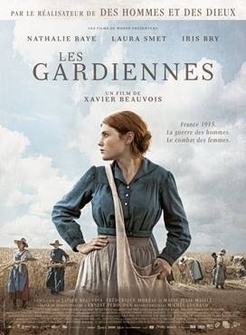This superb rural drama chronicles the lives of women in the countryside in 1915, while the men are fighting on the front during World War I.
Xavier Beauvois takes the measure of time and its perception and delivers a seventh and superb feature film, Les Gardiennes (starring Nathalie Baye and Laura Smet), a tribute to the wives of soldiers from the Great War of 1914-18.
The linear narration, highly pictorial imagery, and the sober and precise direction reflect a representation of the world in tune with this beautiful dark and luminous film, a tale of rules and servitude in which the individual cannot take precedence.
The filmmaker, far from the modern-day mandate of efficiency, believes in duration, silences, and the expressivity of shots—landscapes, still lifes, fragments of bodies—independent of the dialogues.
Today, there are few films that dare to take their time and develop their narrative thread gradually, deepening the environment and establishing the situations.
1915, at the Paridier farm, the women have taken over from the men who have gone to the front. Their lives are paced between hard work and the return of men on leave. Hortense, the matriarch, hires a young girl from public assistance to help them.
Women on a farm a century ago, during World War I, is, in all respects, embarking on a journey to the past. The world represented, the old French peasantry, is almost erased.
Gradually, the film’s uniqueness unfolds: this timeless interlude, spanning seasons, years.
Xavier Beauvois and his cinematographer Caroline Champetier magnificently film the faces: Laura Smet (the eldest daughter), Cyril Descours (the younger son) have never seemed so vulnerable and authentic. In the role of the orphan, the newcomer Iris Bry, a blend of modesty and brilliance, irresistibly becomes the true heroine of Les Gardiennes.
It is she who embodies, in a few luminous scenes, the impending emancipation of women and, at the end of this war, the unexpected return of joy.


